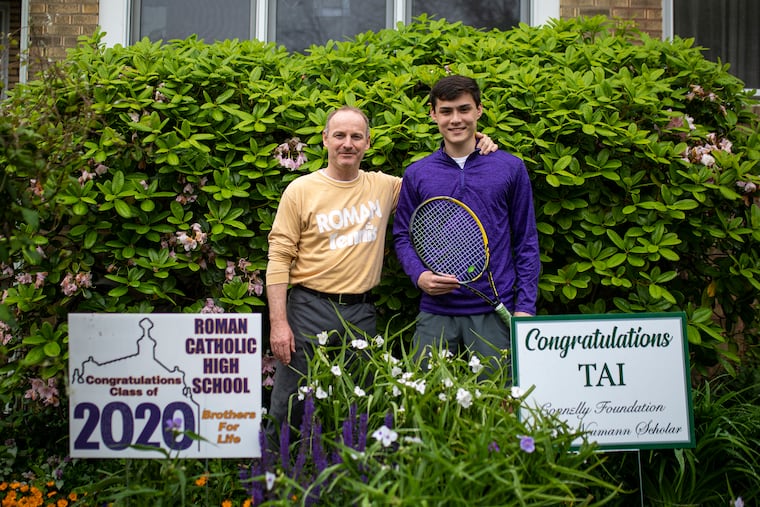Pat Shanahan, longtime tennis coach at city high schools, to step down
For 30 years, the former St. John Neumann High and La Salle University player worked to keep the sport alive at city high schools.

When Patrick Shanahan was a senior at St. John Neumann in the late 1970s, the Pirates had a tennis team. They didn’t have a tennis coach.
“We had just won the [Philadelphia Catholic League] Southern Division my junior year,” Shanahan recalled. “The school was going to drop the sport. They were like, ‘Well, we don’t have anybody to coach it.’ ”
In a move that would foreshadow much of his life, Shanahan joined with teammates on a mission to save the sport at the high school in South Philadelphia. They convinced a recent graduate and former player named Ricky Tait to coach the team that season.
“We told him, ‘You don’t even have to come to the practices,’ ” Shanahan said.
Shanahan played that season under Tait and four years at La Salle University under Jeff Marmon. He learned a lot of about the game but even more about service.
Shanahan, 58, plans to retire at the end of this school year after 34 years as a coach, including the last 21 at Roman Catholic. Shanahan also coached at Neumann Goretti for nine years and La Salle University for four years.
“His whole coaching career has been about service,” Roman Catholic athletic director Matt Griffin said of Shanahan.
For Shanahan, who also is retiring as a business teacher at Roman Catholic, providing opportunities to play tennis for athletes at city high schools has been the theme of his coaching career.
He grew up playing tennis in South Philadelphia, “learning to play against a brick wall.” He never had a lesson, although an older cousin used to take him to the courts.
Through the years, most of Shanahan’s players came from a similar background — city athletes who grew up on basketball courts and soccer fields and gravitated toward tennis as a spring sport.
“Before I went to St. John Neumann, they went 0-10 for like eight straight years,” Shanahan said. “Me and some of my basketball buddies, we decided to play tennis and we got pretty good.
“I’ve been doing the same thing my whole career, just convincing soccer players and basketball players that they can play tennis."
Shanahan’s top player was De’Sean Fennell, who went 61-0 in team matches for Roman Catholic from 2008-11. Fennell, who later played at La Salle University, led the Cahillites to three appearances in the Philadelphia Catholic League finals, losing each time to perennial powerhouse La Salle College High.
“Those were some of the best years of my life,” said Fennell, a substitute teacher at Germantown Friends. “Roman was never known as a tennis school, but Coach Shanahan made us competitive but also made it enjoyable.
“The thing that always stuck with me was that he never wanted anything in return. It was always about the experience for us as players.”
Shanahan regards Marmon, his coach at La Salle University, as a mentor and inspiration. Another former La Salle coach, George Mecherley, as well as former Roman Catholic athletic director Dave Falcione also played pivotal roles in his coaching career.
“I wanted to give it up and Dave Falcione was relentless,” Shanahan said. “Turns out I had 21 more years in me.”
Like all spring-sport coaches, Shanahan missed this season because of the COVID-19 pandemic. He was especially disappointed because it was to have been his final season, the Cahillites were projected to be a strong team, and his son Tai, a Roman senior, was set to play No. 2 singles with highly touted freshman Josh Sor at the No. 1 spot.
“This probably was going to be our best team since De’Sean’s years,” said Shanahan, who plans to continue to work as a small-college basketball referee.
In 30 years of coaching at city high schools, Shanahan’s tennis teams won some and lost some. But he always kept score in another way as well.
“I think the motivating theme for me has been to try to keep tennis alive in the city,” Shanahan said. “It’s known as a country-club sport and the wealthier areas typically produce better tennis players.
“But that’s only because those kids were exposed to it at an earlier age. If city kids were raised with tennis, they would be great players.”